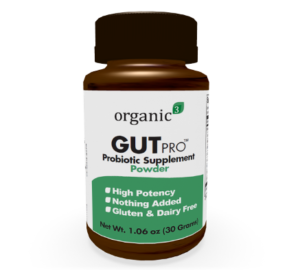Blog & Articles
Can Probiotics Make PANDAS Worse???

What if certain probiotic strains could sometimes make PANDAS symptoms worse, exacerbate chronic fatigue syndrome and other autoimmune disorders, and create brain fog, confusion and depression? I’m not talking about just the ones that contain Strep, and I’m not talking about a “die-off” or a Herx Reaction either, where an individual gets worse before they get better. Sometimes the probiotics themselves may be the problem.
The two most common types of probiotics come from lactic-acid producing bacteria (LAB’s) and bifidobacteria. Of the LAB’s there are two categories:
- Those that primarily produce L-lactic acid/L-lactate
- Those that primarily produce D-lactic acid/D-lactate.
L-Lactate, which is usually predominant in the body, is easily metabolized. For most people D-Lactate is not a problem, either, but in large amounts it may be difficult for those with impaired digestion to break down. This is especially true for those who have difficulty digesting carbohydrates.
Certain probiotics – especially L. acidophilus – are sometimes taken in huge quantities because they’re considered “safe in any amount.” However, L. acidophilus mainly produces D-lactic acid, and for those who cannot easily break this could create unintended consequences. D-lactic acidosis (or a sub-clinical form of the same) occurs when the body is unable to rid itself of D-lactic acid. Diet – especially a diet rich in carbs if an individual cannot digest them well – is considered by some to be the main factor behind acidosis. As we’ll discuss later on, though, there are studies which indicate probiotic use can also induce this condition.
Here’s what happens at a cellular level: D-lactate buildup causes cellular metabolism of glucose to switch from an aerobic (oxygen-rich) process to an anaerobic (oxygen-deprived) process. In this oxygen-starved environment cells are unable to produce adequate amounts of adenosine triphosphate (ATP), which is needed for the “synthesis, degradation and ‘firing’ of neurotransmitter molecules.”)
Low ATP can affect cognitive function, create feelings of fatigue and impair coordination among other things. More generally, symptoms of D-Lactic acidosis include fatigue, confusion, impaired central nervous system function, impaired coordination, depression, nausea, vomiting, anxiety, anemia, headaches and in extreme cases encephalitis.
Fatigue and brain fog? Does this sound familiar to you? Is It Really “Die-Off”?
If you’ve come across the GAPS or SCD protocol before, you already know that re-balancing damaged gut flora can involve some pretty unpleasant experiences. Tops on that list is the Herxheimer reaction (aka “die off”), which is a term that “was coined to describe what Karl Herxheimer saw when he administrated drugs to patients. The reaction is thought to happen when toxins from dying pathogens (viruses, bacteria, parasites, candida, etc.) overwhelm the body’s abilities to clear them out.”
Basically, the idea is that it’s normal for some people to temporarily feel bad when introducing probiotics – the body working hard to clear a lot of junk out all at once! But what if that’s not what’s happening? Acidosis and die-off can have very similar symptoms so they could be easily confused. “Die-off” typically lasts 3-7 days according to some experts, so if it’s lasting longer than that it might be worth considering acidosis or another factor.
What the Studies Say…
Unless they’re taking mega doses, it appears that most people with good digestion will be able to clear excess D-lactate. Unfortunately, the individuals most likely to experience side effects from D-lactate are those who are taking probiotics therapeutically for conditions such as:
- PANDAS
- Autism
- ADD
- Chronic Fatigue Syndrome
- Leaky Gut Syndrome
- Compromised Immune System
In a recent study 14 people whose invasive infection was attributed to probiotics were immune compromised) Since the side effects can be the same as the original symptoms it’s hard to figure out what’s going on without a lab test, but we do know in general that abnormally high levels of D-lactic acid have been observed in some individuals with chronic fatigue, autism and PANDAS. According to one study: Coleman and Blass were the first to link to bioenergy metabolism disturbances with ASD [autism spectrum disorder]. They reported lactic acidosis in four children with autism. Later, Laszlo et al. reported increased serotonin, lactic acid and pyruvate levels in children with autism. Lombard then proposed that mitochondrial oxidative phosphorylation defects could cause abnormal brain metabolism in children with autism, leading to lactic acidosis and decreased serum carnitine levels.
Probiotics & Antibiotics Both Implicated
Ironically, both probiotics AND antibiotics are implicated in D-lactate acidosis. This study found that invasive infection from probiotic strains is rare but possible, though some actual infection rates may be under-reported due to misdiagnosis as “die-off.” In this study set, a little girl who had been given acidophilus from 4 months to 18 months began exhibiting “nervous shuddering, ticks, and OCD tendencies with greatly increased amounts of flatulence.” Lab tests indicated an overgrowth of L. acidophilus as the possible culprit.
On the flipside, some D-lactic acid producing bacteria appear to be antibiotic resistant, which means they could survive a course of antibiotics which killed everything else. With the competition eliminated, D-lactate producing bacteria could gain a stronger hold.
D-Lactate Acidosis and Neurotoxicity
This is simple math, really: Studies indicating probiotic induced acidosis + studies confirming neurotoxicity from D-Lactic acidosis = popular probiotic strains may induce neurotoxicity.
So Are Probiotics Worth it?
I imagine some of you are wondering whether it’s worth it to continue taking probiotics. I’m not an expert, but I personally think they’re crucial to PANDAS recovery. The benefits of lactic acid producing bacteria (LAB’s) have been thoroughly documented, and research indicates that trying to eliminate them completely can negatively affect our inner-ecology in different ways. Should we rethink megadoses of L. acidophilus and monitor individuals with compromised digestion for signs of acidosis? I think so, especially in cases where people are working hard to heal and not seeing the results they expect.
For me, the important thing to understand is that certain species of lactobacillus may be more compatible with our biology than others. Just about everyone easily clears L-lactate, so I think it is important to buy probiotics that focus on strains which primarily produce this acid instead of D-lactate. We recomend a brand called Gutpro powder which was specifically designed with PANDAS in mind. For more information click here:
Gutpro Probiotics Click on Link Below:

http://www.corganic.com/gutpro/#558810f1095b5
GutPro’s™ unique custom probiotic formula is based on extensive research gathered from communities with a vested interest in improving gut health.
- GAPS Diet (Gut and Psychology Syndrome)
- Body Ecology Diet
- Gluten Free / Casein Free / Soy Free (GFCFSF)
- Autism / PDD-NOS
- PANDAS, PANS (Pediatric Autoimmune Neuropsychiatric Disorders Associated with Streptococcal infections)
Unlike other probiotics, GutPro™ is free of unwanted additives
- No allergens (e.g. dairy, corn, soy, gluten. GutPro™ probiotic is produced on a non-dairy, non-soy vegetarian culture)
- No fillers or excipients (e.g. inulin, cellulose, maltodextrin, FOS)
- No strains that are reported to cause reactions (e.g. streptococcus thermophilus, etc)
- No strains that contribute to d-lactic acidosis (e.g. l-acidophilus, etc)
- No unnecessary ingredients (e.g. magnesium stearate, silica, titanium dioxide)
